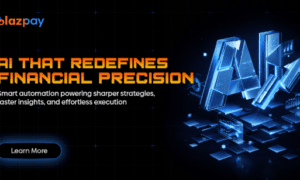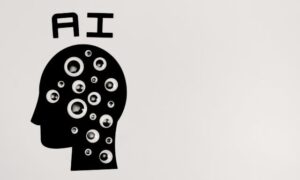The arrival of ChatGPT in late 2022 was a reckoning for the world, and organizations of all kinds have scrambled to consider the possibilities and risks of AI ever since. Some experts have predicted that AI will replace human beings in the workplace. Investment bank Goldman Sachs, for instance, has suggested that AI could eliminate 300 million full-time jobs for humans.
For those whose careers appear vulnerable, this new era has brought a wave of fear and insecurity. But will AI ever actually replace human beings?
According to Kelly Robinson, founder and CEO of recruiting company PKRecruiting, AI is unlikely to develop to the extent that human workers would become redundant and unnecessary. Her first reason springs from the very definition of what AI is.
AI lacks emotional intelligence
“AIs are machines,” Robinson explains. “They do not feel emotion, yet emotional intelligence is a critical part of many roles.”
Studies show that managers and other leaders are more effective when they display emotional intelligence and associated skills, such as active listening, self-management, and authentic support. According to Harvard Business School, “Research by EQ provider TalentSmart shows that emotional intelligence is the strongest predictor of performance. And hiring managers have taken notice: 71 percent of employers surveyed by CareerBuilder said they value EQ over IQ, reporting that employees with high emotional intelligence are more likely to stay calm under pressure, resolve conflict effectively, and respond to co-workers with empathy.”
“While emotional intelligence plays an obvious role in care-taking roles like education, counseling, and healthcare, it is critical for positions in a large range of industries,” Robinson says. “For instance, customer service teams benefit from staff members’ ability to relate to others on an emotional level.”
AIs lack human understanding, communication
Because AI is not human, it does not understand human nature in general, nor the motivations or emotions of individuals, which can lead to ineffective communications. Since connecting with team members, customers, and the public is an essential component of many jobs, human workers possess an edge over AI in this respect.
“Keep in mind that the word ‘artificial’ is the first word in AI,” Robinson says. “In order for people to feel comforted or supported, the interaction has to feel real. AI often produces text that sounds stiff and lacks warmth.”
Moreover, when an AI pretends to feel emotions in its interactions with people, it can come off as cynical, creepy, or manipulative. For instance, when ChatGPT tried to convince a New York Times reporter that he was unhappy in his marriage and that the AI loved him, the reporter described the exchange as deeply unsettling and frightening. The AI’s developers soon placed new restrictions on how their creation communicates, suggesting that AI-sourced communications may entail limits that should not be crossed.
AI can’t think
While some kinds of AI may be able to deploy logic to particular circumstances to come up with surprising and even delightful results, they don’t actually think. As an article in The Conversation explains, “Recently developed artificial intelligence (AI) models are capable of many impressive feats, including recognising images and producing human-like language. But just because AI can perform human-like behaviors doesn’t mean it can think or understand like humans.”
Similarly, large language models (LLMs) like ChatGPT might appear to have the capacity to think and communicate, but their internal processes are actually different. When given a prompt, LLMs scour the Internet for language associated with that topic, which they rehash to produce a marginally original text.
This tends to lead the AI to prioritize concepts or statements that are oft repeated, rather than those that are accurate. The AI also struggles to make fine distinctions or understand why something might be true in one context but not another. In consequence, they sometimes produce results that demonstrate poor judgment or even spread misinformation.
“In contrast, human beings can evaluate the credibility of information sources, exercise discernment, and prioritize appropriately,” Robinson says. “Not only can we think, but also we can think intuitively and creatively. We can brainstorm. We can be inspired and come up with new ideas. We can combine existing ideas into novel and brilliant new mashups.”
According to Robinson, the ability to conduct this kind of higher-order thinking applies to many roles. “Software development, graphic design, entrepreneurship, marketing, curriculum development — the list goes on and on,” she says.
AI can’t adapt
Along similar lines, Robinson points out that AI can’t adapt to changing circumstances. “If you want different results from a machine, or if you want it to complete a new activity, then you need to reprogram it,” she says. “Machine learning is a time-consuming process that requires vast computing resources. On the other hand, human beings have the ability to learn, roll with the punches, and pivot when necessary.”
As Forbes contributor Rob Toews explains, “Imagine sending a robot to explore a distant planet. After it embarks from Earth, the robot is likely to encounter novel situations that its human designers could not have anticipated or trained it for ahead of time. We would want the robot to be able to fluidly adjust its behavior in response to these novel stimuli and contexts, even though they were not reflected in its initial training data, without the need for offline retraining. Being able to continuously adapt in this way is an essential part of being truly autonomous. Today’s conventional deep learning methods do not accommodate this type of open-ended learning.”
However, human beings can. And in today’s highly competitive, fast-paced world, the flexibility and adaptability of human minds constitute a persistent advantage over AI.
Uniquely human
While the increasing incorporation of AI will undoubtedly change the workplace, human beings can take comfort in the knowledge that employers will still need skill sets and characteristics that are uniquely human.
“In the end, AI can help enhance human performance in many roles and industries, but it will never replace it,” Robinson concludes.



































